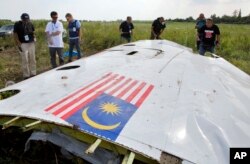International investigators looking into the shootdown of Malaysia Airlines Flight MH17 over eastern Ukraine four years ago have identified the Russian military brigade that they believe owned the missile used to bring down the Boeing 777.
WATCH: Henry Ridgwell's video report
It’s the first time the Joint investigation Team, or JIT, which is made up of prosecutors from the Netherlands, Ukraine, Malaysia and Australia, has suggested Russian involvement.
Two-hundred-and-83 passengers and 15 crew members were killed when the aircraft was shot down on July 17 2014. The incident happened about three hours into the journey from Amsterdam to Kuala Lumpur.
The JIT already had released evidence suggesting the plane was hit by a Russian BUK surface-to-air missile that had crossed into eastern Ukraine from Russia. At a press conference Thursday in The Hague, chief prosecutor Fred Westerbeke said they had pinpointed the origin of the missile launcher used, saying they had evidence that would "stand in a courtroom."
“Today the JIT concluded the BUK missile launcher that was used to shoot down MH17 originated from the 53rd anti-aircraft missile brigade of the Russian armed forces,” Westerbeke told reporters.
The conclusions echo those made by the independent investigative website "Bellingcat," which is using open source evidence such as videos and photographs posted online, purportedly showing the BUK launcher after the attack, with one weapon missing.
Westerbeke said the investigation was in its last phase and repeated earlier calls for witnesses and evidence, promising anonymity to anyone who comes forward. He said they were interested in the chain of command that led to the BUK launcher firing the missile.
“We call today by the means of the media for the help of the public to answer questions about the control and use of this BUK launcher as well as about the missile that was launched,” said Westerbeke.
With Russia using its seat on the United Nations Security Council to block an international tribunal, any future trial likely would be held in the Netherlands.
“The possibility that Russia would extradite or allow its citizens who are suspected of participating in the destruction of the plane, to participate in an international investigation seems very, very unlikely,” said Andrew Foxall, head of the Russia program at policy analyst group The Henry Jackson Society.
He adds that the MH17 investigation should prompt Western nations to maintain sanctions on Russia.
“We’re now 2018, four years on from the illegal annexation of Crimea, the destabilization of eastern Ukraine, the destruction of MH17, and there are Western countries who seemingly would like to return to business as usual with Russia. Fortunately, the Western position has held thus far, but there’s no guarantee that it will hold in the long run,” said Foxall.
Moscow has consistently denied any involvement, and suggested the Ukrainian military shot down the plane. Investigators repeatedly have dismissed any evidence presented for this claim.








